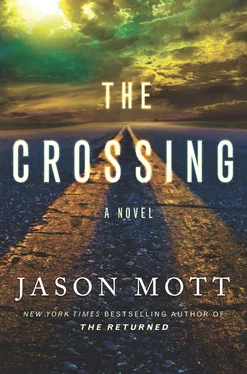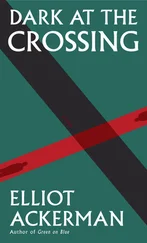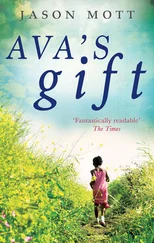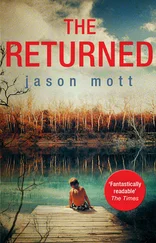Your mother and I went back and forth for years. We felt we had a duty to wait for things to get better. A duty not only to you, but to everyone else. This world, in whatever form it takes, is a product of us all. We forge hope or sow terror. We dole them out in measurements of our own choosing.
But still, it’s a big world. I was just a small-town newspaper writer. She a science teacher. How much could we really do about anything?
At some point in your life, you’ll want to know where we were when everything changed. It’s a hard question to answer, like trying to find the moment when a little hill of rocks became a mountain. It happens suddenly and all at once, like a lightning strike, and after the flash fades, you turn to see that your home has burned to the ground.
While there are a dozen days in which the world changed, and some of them I will tell you about, I’ll answer your inevitable question about the moment when things went from the way they were to the way they would become:
We were in North Carolina visiting your mother’s parents on the day the towers fell. Your mother, your grandparents and I all spent the morning huddled together in front of the television, watching it happen, just like everyone else. Your grandfather, a stoic man by nature, sat unmoving in his chair for hours, letting what was happening wash over him like floodwaters sweeping over a headstone. When he did finally speak, all he said was, “I’m sorry.”
By sunset we were all wrung out. Raw and frayed at the edges. We wanted to sleep, but it was early yet and, even beyond that, we knew that it would be a sleepless night. So your mother and I went for a walk. Her parents lived in a small community on the Intracoastal Waterway where large houses smelled of seawater. Small cars steered gingerly over the earth, guided by retired hands. The ocean thinned out into tendrils of tributaries only a stone’s throw from the bedrooms of children.
The streets were empty because the television was still full of tragedy. Your mother and I walked the vacant roads alone. Sometimes the wind carried the sound of sobbing from nearby houses. We pretended it was the sound of laughter. A lie, but one we felt it was okay to tell ourselves.
Eventually we found a sandy road leading off into the woods. It led to a collection of abandoned buildings. Once upon a time, it had been a summer camp of some sort. Square, concrete buildings held empty wiry bunks, rusting and half-reclaimed by underbrush. A large, high-ceilinged classroom stood at the center of the complex, covered in graffiti and shaggy with kudzu that trembled like grasshoppers when the wind blew.
We moved through the empty, forgotten buildings, stepping slowly, detached from everything, even ourselves, like ghosts. When we had seen enough we followed the edge of the property and found that it led to the ocean. The sun was setting behind a wall of clouds. Just before it disappeared, it flared, shifting colors, from beautiful to ominous, the way a goldfish swimming in a bowl can, with the proper play of lighting, suddenly become an apostrophe of blood.
Then the sun was gone and the moon rose above the water.
As we stood and watched, the light from the moon poured down onto the ocean water. The water swung from black to gray to silver. And then it continued to change. From silver to turquoise to, finally, a glowing, electric blue. I can’t remember ever seeing that particular shade of blue. And I have never seen it since. The water looked like lightning, lightning that coiled itself into waves, only to flatten and bubble against the shore, still glowing. Just then, your mother and I could believe we had stumbled upon another planet. Some near-dimension mirror-image earth. A horror-beauty of a world where planes leveled buildings and lightning became water at moonrise.
Wordlessly, your mother stripped off her clothes and, without testing the depths or the dangers, dove in. She disappeared and reemerged, glowing like a glacier. “We don’t know what this is,” I said.
“It’ll be okay,” she said.
I wasn’t sure I believed her, but I followed anyway. There was never any choice. Not really.
We swam into this new world.
Later that night we told your grandfather what had happened. “Heaven’s Tide,” he said. “You don’t know how lucky you are to see such a thing.”
After a bit of research, I learned that it was just a strain of bioluminescent algae. A completely natural occurrence that had happened before and would happen again. The only thing different about this time was that your mother and I had been there to bear witness to it. It was our old, familiar world all the while. It had only chosen to show us something rare and wondrous.
“It’s not all horrible,” your mother said to me later that night. It was her way of saying, “Let’s try a family, even in this world.”
It would be years before we succeeded. In the interim the world continued to change. I responded by writing these notes, letters, whatever they are. I write them for you, in case it all falls apart. I write them for myself, to say that it doesn’t have to. I write them to prove that the world has always been this hard. I write them to prove that the future was always meant to be a promise, not a threat.
THREE
“There are bad ideas, and then there are bad ideas,” Gannon grumbled from the back seat. The sick Old Man beside him said nothing, because that was the way it always was with him.
Behind the wheel Tommy clunked the car into gear and steered it gently off the highway. I sat in the passenger seat, pointing ahead through the window at the path we should take. “Head toward that tree line,” I said.
“Those trees won’t hide a car,” Gannon said. He chuckled a little, then hardened his grin, as though he hadn’t meant to find anything funny just now. He looked over at his father, checking to be sure that he was okay, then turned back to Tommy. “Hell of a right hook you’ve got there.” He pressed his hand to the back of his head and checked his palm for blood. “But you always were strong as an ox, weren’t you?”
“Can you just stop talking?” Tommy asked.
“It doesn’t matter if he talks,” I said. “Don’t listen. Just get us over behind those trees.”
“It’s a hell of a world we live in, I suppose,” Gannon said with a sigh, as though resigning himself to something. Then he leaned back and closed his eyes and hummed so quietly that the sound was only there for a moment before being swallowed up by the lope of the engine as the car bobbled up and down over the rough-hewn field.
“I’m not the one who sent you that draft notice, Tommy,” Gannon said. “You’ve already let her get you into more trouble than you had to, son.”
“He’s not your son,” I said.
“You’re just a strong back to her, Tommy,” Gannon said, as though I hadn’t spoken. “She’ll never make it without you and she knows it. That’s the reason she’s dragging you along on this. Don’t you dare think it’s anything different than that. I’m the only person that can make this right with the draft, son. I’m trying to help you. They don’t treat dodgers too good.”
“Yeah,” I replied, “they send them off to war.”
Tommy let out a stiff laugh.
Though the ground was frozen and hard now, the winter had come with fits of warmth that had unlocked the earth into a bog only for it to refreeze days later, misshapen and awkward, like a heart riding the highs and lows of love and hate over the course of a long marriage. Here and there the ground dipped, long and deep as a starving belly, and the car was thrown down into a depression and all Tommy could do was hold tight to the steering wheel and keep his foot on the accelerator, uncertain whether or not we would be able to climb out of the hole in which we found ourselves. But Tommy was good behind the wheel and he got the car over to the trees that jutted out, dense and bare, on the far edge of the field.
Читать дальше












